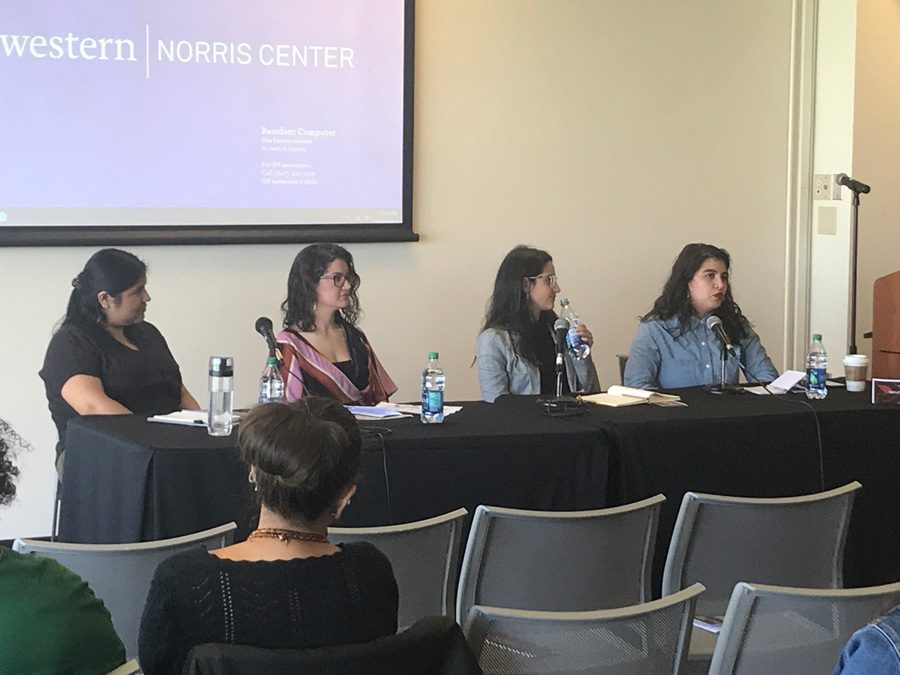Professors of Latina and Latino Studies Program reflect on first 10 years
Wilson Chapman/Daily Senior Staffer
Panelists speak at Latinx studies event. The symposium saw faculty reflect on the first 10 years of Northwestern’s Latina and Latino Studies Program.
May 12, 2019
When Arianna Hermosillo (Medill ’10) first enrolled at Northwestern, she had no intention of being an activist. All she thought about was doing her homework and keeping in touch with her mom. But when she felt homesick and wanted to find a community at Northwestern, she signed up to join a committee to help fight for the establishment of a Latina and Latino Studies Program. Despite joining on a whim, working with the group became one of her most meaningful experiences at Northwestern.
“What’s enduring for me is just the fact that it’s okay to ask for more. It’s okay to ask for better,” Hermosillo said of what she learned from her time in LLSP during a Friday panel discussion of LLSP alums. “It’s always okay to strive, and push and challenge leadership and challenge those people in power to advocate for you and for others around you.”
Hermosillo spoke in a panel as part of a symposium celebrating the first 10 years of the Northwestern’s Latina and Latino Studies Program. The event took place in Norris University Center, where Latinx studies professors from different schools spoke, along with students, current and former faculty and alumni. The speakers discussed the initial push 10 years ago to establish the program and the current struggle to sustain the program without department status.
The department status of Northwestern’s Latina and Latino Studies program has been a highly contested issue over the last year. A student activist group, the Latinx Asian American Collective, has been pushing for program departmentalization, arguing that the lack of tenure for professors results in high turnover rates and the lack of funding cripples the program’s effectiveness.
During the symposium, many faculty members expressed similar viewpoints of the collective, and said the program needs to demand more from the University if it’s going to succeed. Monica Russel y Rodriguez, assistant provost for diversity and inclusion, said she was impressed by the way students have contributed to creating the program in the first place, but she thought students should not have to advocate for this cause at all.
“I’m looking forward to the creation of the department and a structure that … will not require students to spend their free time (protesting) when they should be studying,” Rodriguez said.
One of the panels during the symposium saw several professors discuss the implications of the term “Latinx,” which has been widely adopted by academics and younger generations.
Brown University Prof. Ralph Rodriguez said the term is queer in origin, originating from LGBTQ+ friendly spaces on the Internet to refer to and include non-binary people. Rodriguez said while the widespread use of the phrase to be inclusive is well-meaning, he worries it has made the phrase generic and robbed it of the queer context it used to have.
University of Arkansas Prof. Yajaira Padilla said she sees the term as the natural way in which language evolves to become more inclusive, noting several phrases and terms for people from Latin America such as “Chicano” — which used to be used to widely refer to Mexicans before falling out of use — have come and gone.
However, she said she thinks the phrase “Latinx” shouldn’t be used for everyone who has origins in Latin America, as multiple communities, such as Indigenous peoples and Afro-Latinx aren’t necessarily included under such a widespread label. She said she expects the phrase will eventually be replaced as the community continues to evolve.
“The ‘x’ stands for still what is not stated,” Padilla said, “what we don’t know. — for what comes next, and for where we’re going next.”
The final panel was a discussion about the future and struggles of Latinx studies beyond Northwestern, with three professors from other schools discussing changes they want to see occur in the field.
Michigan State University Prof. Yomaira Figueroa said while Latinx studies have been marginalized, certain intersectional identities such as indigenous people and Afro-Latinx have been marginalized within Latinx studies. Figueroa said, Latinx studies needs to include more studies of these intersectional identities and have a more diverse range of professors if the field wants to evolve.
New York University Prof. Darrel Alejandro Holnes agreed with Figueroa, saying Latinx studies have traditionally ignored the wide variety of ethnic groups that fall under the Latinx umbrella. Holnes said he hopes the future of Latinx studies is one where the people teaching it more accurately reflect people with Latin American origins and the rich diversity of the Latinx population.
“I hope the future of Latinx studies is one of radical compassion and empathy,” Holnes said. “One where we seek to blur the lines of how we define community, rather than build walls around it.”
Email: wilsonchapman2021@u.northwestern.edu
Related Stories:
– New council to aid in hiring Asian American and Latinx studies faculty, though students still push for department status
– Latinx Asian American Collective updates students on departmentalization at teach-in event
– MEChA, APAC members push for department status for ethnic studies



